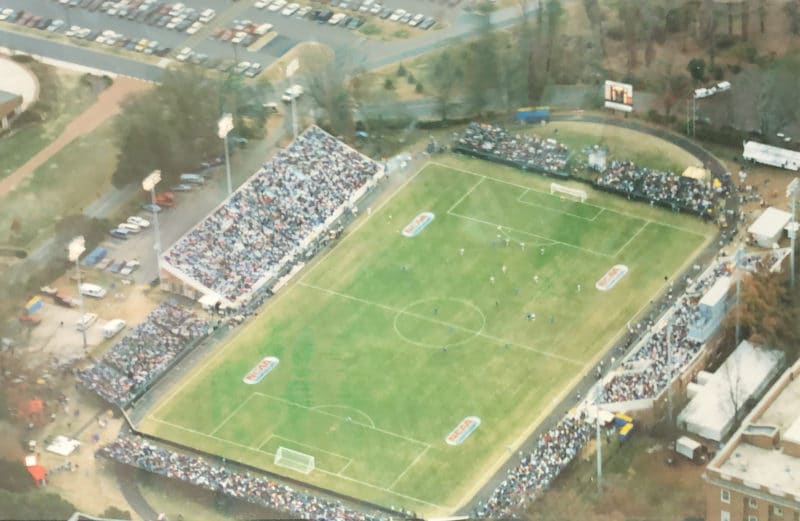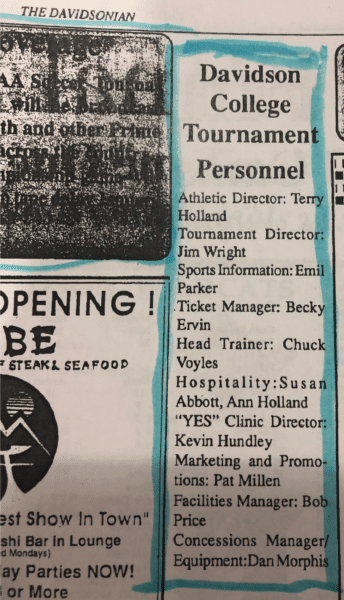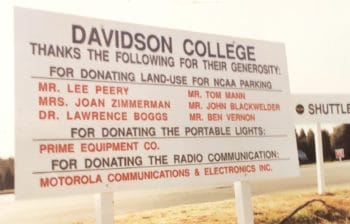SPORTS
Do You Remember When Davidson Hosted a Final Four?

An archived aerial view of the NCAA Soccer Final Four in Davidson in 1992.
(Editor’s NOTE: Jonathan Swann – Davidson Class of 2019 – needs your help. If you were living in Davidson and remember details about the Final Four in Davidson – Jonathan is interested in talking with you. He wants to interview a wide variety of people who were part of the event or who experienced it. Jonathan is staying in Davidson until the end of June to conduct the interviews in-person. He hopes to have the much longer article finished by August – in time for the start of the soccer season. If you have a story to share, please email him at [email protected] .)
By: Jonathan Swann, Davidson Class of 2019
Twenty-seven years ago, not only was Davidson College a beloved underdog in athletic competitions, but also a gracious host, serving as the venue for the 1992, 1993, and 1994 NCAA Men’s Soccer Championships (College Cup). It was the first and (so far) only time Davidson has hosted any major national championship. The men’s soccer team, who had a losing record in 1991, made a stunning run to the Final Four in 1992, playing in front of the enthusiastic Davidson fans in the semifinal versus University of San Diego. That underdog run has received most of the headlines, and Davidson’s soccer stadium now bears the name of the 1992 team. In Fall 2017, Davidson celebrated the 25th anniversary of the team, and the commemoration was highlighted by a team reunion at a men’s soccer game, a dinner with Coach McKillop serving as the keynote speaker, and a Davidson Journal article written by Davidson’s own Michael Kruse.

A clip from The Davidsonian listed some of the key players in the tournament planning process.
The significance of Davidson hosting a major championship cannot be overstated. Davidson displayed its welcoming atmosphere for a national audience and there were sellout crowds and rave reviews from fans, both near and far, who came to watch. Davidson students, staff, faculty, and fans have fond and lasting memories when Davidson hosted. Coach McKillop, who was in the early years of his tenure as Head Coach, said in his keynote speech in 2017 that the magical run was a catalyst for his eventual success as more people across the country came to know about the magic of Davidson. But how and why was tiny Davidson selected as the host and why was the venue so successful? How did the skyrocketing popularity of soccer in the United States (the 1994 World Cup was played here, as well) coincide with the popularity of the championship? And finally, why should we care today, 25 years later, that Davidson hosted the NCAA championship?
Let’s start at the beginning. Davidson put in a bid to host, thanks to then-Athletic Director Terry Holland ‘64, who played basketball under Hall of Fame coach Lefty Driesell, and then-Head Men’s Soccer Coach Charlie Slagle ‘75, who felt Davidson would be a worthy host. In 1991, Davidson was in the Southern Conference and the men’s soccer team was coached by Slagle, who graduated from Davidson in the early 1980s and came back to coach. Both Holland and Slagle felt Davidson had potential to be an excellent venue for the tournament.
According to then-Director of Athletic Marketing Pat Millen ‘86, Holland believed Davidson was a prime contender for hosting for several reasons. First, Davidson is in a good location because it is close to Charlotte, which has a major airport. There is also a passionate soccer fan base in the Lake Norman area with plenty of youth soccer players that would be interested in coming to the championship. Several bigger schools, including University of Oregon, University of Florida, University of Texas, University of Southern California, who might have been potential hosts, had large stadiums but didn’t have men’s soccer programs. In addition, the College Cup had had poor attendance the previous two years in Tampa, and so the NCAA was looking for a new venue. According to a Los Angeles Times article from December 1993, before coming to Davidson the Final Four attracted a total of 6,901 fans in 1990 and 6,128 fans in 1991 at USF. The NCAA wanted both a more intimate setting and the Final Four to be the main event in town, which in Tampa was not the case.
In the early 1990s, Charlotte had no professional sports teams and, as a result, the College Cup at Davidson would be the biggest show in town. Also, because the Carolina region is a hotbed of college soccer, with a plethora of top teams in the game, such as Wake Forest, Duke, UNC-Chapel Hill, NC State, among others, Davidson could point to the fans that would travel.

The college posted this “Thank You” sign at one of the shuttle venues during the tournament.
For those reasons, Davidson approached the NCAA in 1991 and put in a bid to host, thanks in part to Holland’s connection with people at NCAA. The bid consisted of a video, a marketing plan, a speculative budget, and a booklet with letters of support, including endorsements from the Governor of North Carolina, the Kiwanis Club, and other local and state officials. Holland, Slagle, and Millen flew out to NCAA HQ to present their final pitch. Millen recalls that when they walked out of the building after making the pitch, Holland turned to Millen and told him Davidson had it. This was even though the other finalists, including Tampa and Richmond, had yet to present.
When bidding for a NCAA championship, winning the bid comes down to a few key factors, according an article published in 2014 in ConnectSports.com. These factors are the venue, the budget, the experiences of the participants, and fans. The NCAA requested that Davidson have a larger venue to host the matches. In the summer of 1991, Richardson Stadium, where matches were played at the time, underwent a $150,000 renovation to outfit the stadium with a new scoreboard, lights, auxiliary stands, and an expansion of the press box to accommodate soccer matches being played and lighting for evening competitions. Those renovations forced the reduction in capacity of the stadium to 6,000 seats, which helped create a more intimate and louder atmosphere.
The marketing for the Cup began immediately. From flyers to billboards on I-77, to word of mouth, Davidson Athletics used every strategy to convince fans to show up. According to the Los Angeles Times article, the 45,000 youth soccer players within a 50-mile radius of Davidson were the primary targets of marketing efforts. On July 1, tickets were released to the public and by Labor Day they were sold out. A makeshift parking lot where Homewood suites now stands was used to shuttle fans to campus. National media all sent a journalist to cover the College Cup.
Davidson had a ten-person staff that worked year-round on the Final Four. Thirty others concentrated on it from September until the championship and another 50 helped in the three weeks leading up to the event, and hundreds of volunteers worked the weekend. In 1993, thanks to Davidson’s run, all the tickets were sold out within an hour. The Davidson Board of Trustees could only get standing room only tickets. At the NCCA convention in January 1993, Davidson staff were celebrities. The Los Angeles Times article in December 1993, after Davidson had hosted two championships, was titled “Soccer Capital: Davidson College Would Like to Become Permanent Final Four Site.”
The College Cup was a great success for three years running at Davidson, with NCAA-record attendance and effusive reviews from fans, players, coaches, and administrators. Although the College Cup moved onto Richmond after Davidson and then back to Charlotte for two years, the successful hosting showed the NCAA that fans will come out, almost irrespective of hosting city size. Coach McKillop, a young basketball coach who had a few losing seasons at Davidson, was grateful for the publicity the College Cup gave Davidson Athletics.
College Soccer Weekly, a competition between top college soccer teams, was started in 1993 because of the success of the Cup. Holland wisely paid for production rights for the Cup and it was televised across the country. In 1994, the World Cup was played in the United States and marked the evolution of soccer in this country.


